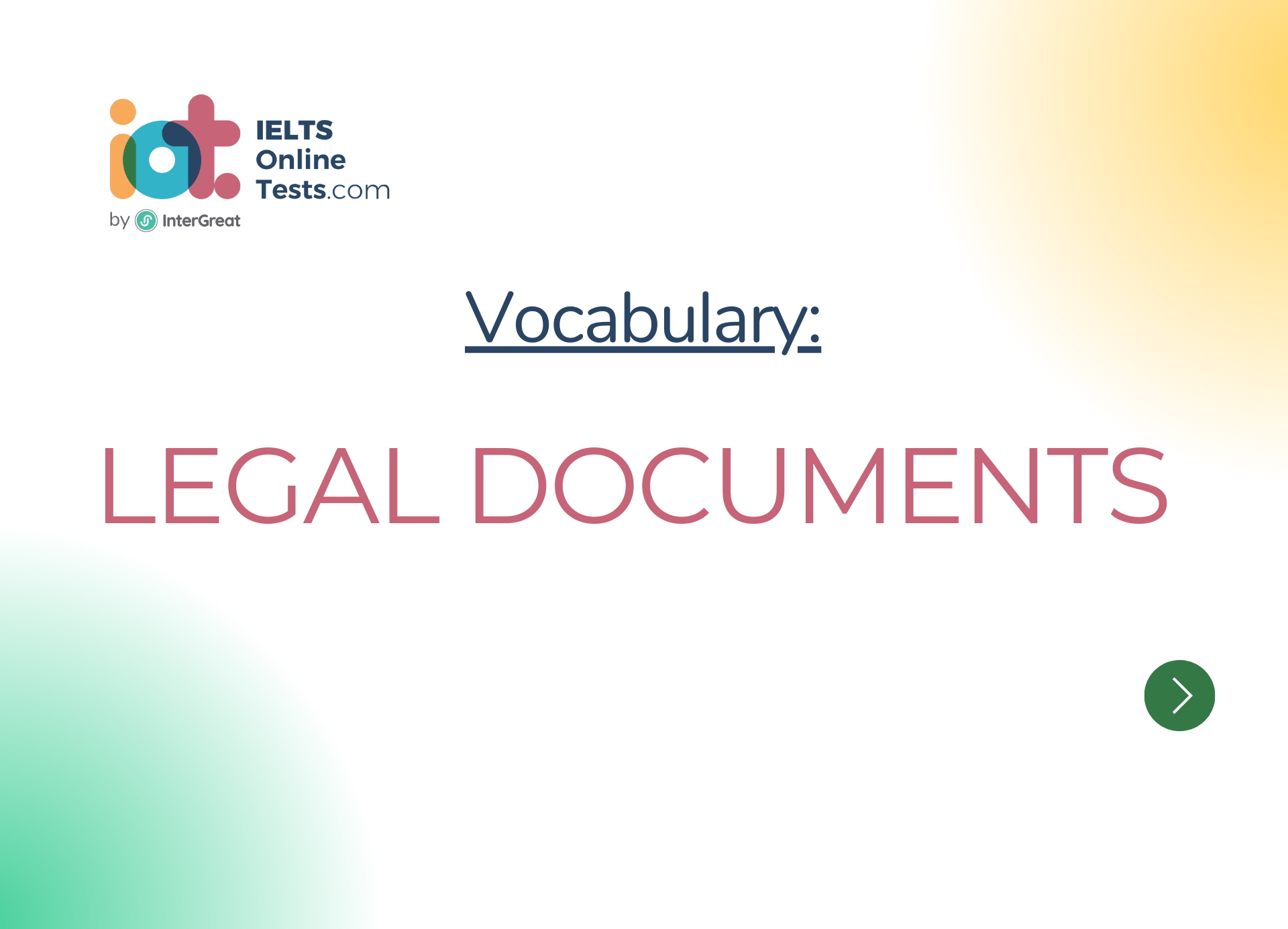
Legal documents
Below is a comprehensive list of vocabulary related to "Legal Documents" to help you effectively discuss various legal papers and concepts in English, suitable for the IELTS band score range of 6.5-8.0:
Contract:
Definition: A legally binding agreement between two or more parties that outlines the terms and conditions of their relationship or transaction.
Example: The parties signed a contract to formalize their business partnership.
Agreement:
Definition: A mutual understanding or arrangement between parties regarding a specific matter, which may or may not be legally binding.
Example: The parties reached a verbal agreement on the terms of the sale.
Lease:
Definition: A legal document that grants a tenant the right to use a property owned by the landlord in exchange for rent payment.
Example: The lease includes a clause specifying the duration of the tenancy.
Deed:
Definition: A legal document that transfers the ownership of real estate from one party to another.
Example: The property deed was recorded at the county courthouse.
Will:
Definition: A legal document that specifies an individual's wishes regarding the distribution of their assets and the care of dependents after their death.
Example: The testator appointed an executor to carry out the provisions of the will.
Power of Attorney (POA):
Definition: A legal document that authorizes someone to act on behalf of another person in financial or legal matters.
Example: The elderly woman granted her daughter a power of attorney to handle her affairs.
Affidavit:
Definition: A written statement of facts sworn or affirmed by an individual before a notary public or authorized official.
Example: The witness signed an affidavit to confirm the accuracy of their account.
Summons:
Definition: A legal document issued by a court that commands a person to appear before the court or respond to a legal proceeding.
Example: The defendant received a summons to attend the court hearing.
Complaint:
Definition: A formal legal document filed by a plaintiff that initiates a lawsuit and sets out the allegations against the defendant.
Example: The complaint alleges negligence on the part of the defendant.
Petition:
Definition: A written request or application presented to a court or authority seeking a specific action or remedy.
Example: The residents filed a petition to request changes to local zoning laws.
Plea:
Definition: A defendant's formal response to the charges brought against them in court (e.g., guilty, not guilty, no contest).
Example: The defendant entered a plea of not guilty.
Subpoena:
Definition: A legal order that requires a person to appear in court as a witness or to produce certain documents.
Example: The witness received a subpoena to testify in the trial.
Release:
Definition: A legal document that absolves a party from certain claims, liabilities, or obligations.
Example: The parties signed a release to settle the dispute out of court.
Confidentiality Agreement:
Definition: A contract that legally binds parties to keep certain information confidential and not disclose it to others.
Example: Employees often sign confidentiality agreements to protect sensitive company information.
Amendment:
Definition: A formal change or addition made to a legal document, such as a contract or a constitution.
Example: The parties agreed to an amendment to modify the original agreement.
Indemnity Agreement:
Definition: A contract in which one party agrees to compensate the other for specific losses or damages.
Example: The contractor provided an indemnity agreement to protect the client against potential liabilities.
Intellectual Property Agreement:
Definition: A contract that governs the use and protection of intellectual property rights, such as copyrights, trademarks, and patents.
Example: The company entered into an intellectual property agreement to license its technology to a partner.
Non-Disclosure Agreement (NDA):
Definition: A contract that legally binds parties to keep certain information confidential and not disclose it to third parties.
Example: Before discussing sensitive business details, the parties signed a non-disclosure agreement.
Arbitration Agreement:
Definition: A contract in which parties agree to resolve disputes through arbitration instead of litigation.
Example: The employment contract contained an arbitration agreement to settle any workplace disputes.
Confession of Judgment:
Definition: A legal document in which a debtor admits to owing a debt and consents to the creditor obtaining a judgment against them without further legal proceedings.
Example: The defendant signed a confession of judgment to expedite the repayment process.
Waiver:
Definition: A voluntary relinquishment of a right or claim, typically documented in writing.
Example: Before participating in the activity, participants must sign a waiver releasing the organizers from liability.
Letter of Intent (LOI):
Definition: A preliminary document expressing a party's intention to enter into a more formal agreement or transaction.
Example: The company issued a letter of intent to negotiate a potential merger with another firm.
Memorandum of Understanding (MOU):
Definition: A non-binding agreement between parties outlining their mutual understanding and cooperation on a specific matter.
Example: The two organizations signed an MOU to collaborate on a research project.
Service Level Agreement (SLA):
Definition: A contract that defines the level of service and performance standards to be maintained between a service provider and a client.
Example: The IT company offered a service level agreement with guaranteed response times for technical support.
Guarantee:
Definition: A formal promise to take responsibility for the debt or obligation of another party if they fail to fulfill their obligations.
Example: The contractor provided a guarantee for the quality of their workmanship.
By familiarizing yourself with these legal document-related terms and using them appropriately in your discussions or writing, you can demonstrate a strong grasp of legal language and enhance your communication skills for achieving a higher band score in the IELTS exam. Good luck with your studies!




